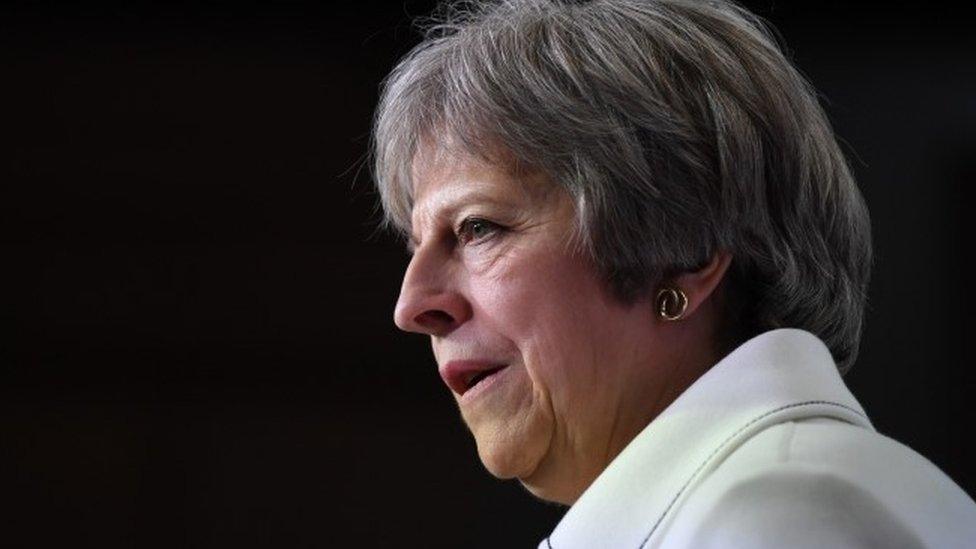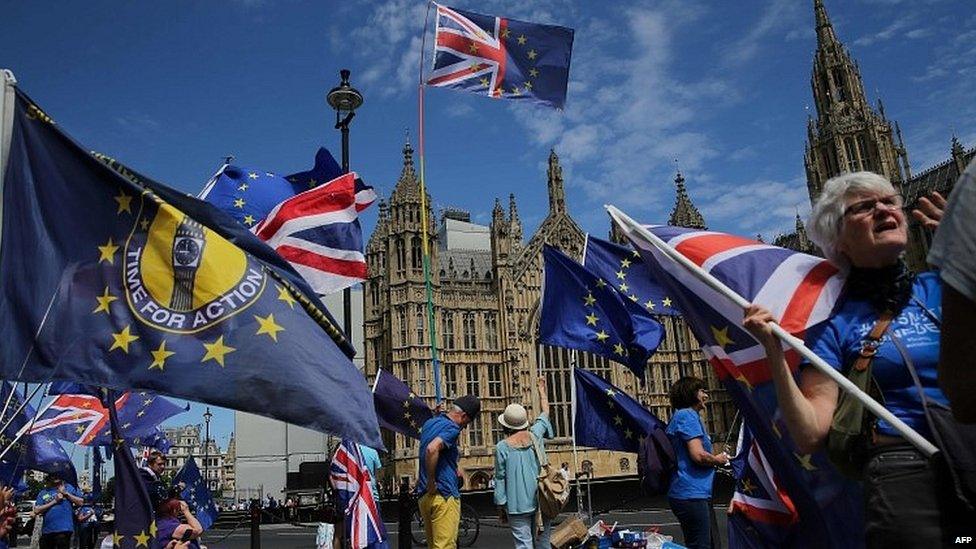Theresa May tells MPs not to undermine UK's Brexit negotiations
- Published
- comments

The PM wants to avoid defeats ahead of a crucial summit of EU leaders later this month
The UK's negotiating position will be undermined if MPs defeat the government in key votes on its Brexit bill, Theresa May has told Tory MPs.
The prime minister told backbenchers to "think about the message Parliament will send to the European Union".
She wants to overturn a series of amendments made by the House of Lords.
A compromise proposal is being worked on which could help Mrs May avoid defeat on whether the UK should seek to stay in a customs union with the EU.
The move, being brokered by former Cabinet minister Oliver Letwin, came after rebel MPs suggested they have sufficient numbers to threaten the government and wanted more concessions.
A big week for Brexit
What is the EU customs union?
There will be two days of votes on the EU Withdrawal Bill on Tuesday and Wednesday.
The bill is the key legislation the government needs to pass to make its Brexit strategy work. But the House of Lords has put forward changes to it which would require a different approach in some key areas.
This week the government wants to kill off most of these changes - but numbers in the House of Commons are finely balanced, with the Conservatives needing the help of Northern Ireland's Democratic Unionist Party to get a majority.
The two amendments set to be most tricky for the government are one on Tuesday, which gives Parliament a decisive vote over the final Brexit deal, and another on Wednesday which instructs Mrs May to negotiate a customs union with the EU.
Conservative MP Sarah Wollaston told BBC Radio 4's Today programme she was "minded" to vote against the government on the first of these, which calls for Parliament to get a "meaningful vote" on any final deal struck between the UK and EU.
She also called for "further concessions" from the government on the customs union amendment.
Conservative backbench MP Jacob Rees-Mogg said he thought the government would win the day.
Speaking on LBC, Mr Rees-Mogg, who chairs the pro-Brexit European Research Group of Tory MPs, predicted "there will be unity, it won't be perfect" but that it would be "enough to get the bill through".
The key dates ahead on Brexit
What is the EU Withdrawal Bill?
It is the legislation aimed at ensuring the UK has a smooth transition out of the EU.
It will repeal the European Communities Act, which took Britain into what was then the European Economic Community, meaning EU law is no longer supreme in the UK.
And to avoid a sudden "cliff edge" on Brexit day, 29 March 2019, it would also convert existing EU law into UK law so the government and Parliament can decide at a later date which bits they want to keep or change.
The bill has also become of the focus of several attempts by MPs and peers to change parts of the government's approach to Brexit.
The legislation is now back before the House of Commons after a total of 15 defeats by the House of Lords.
What MPs will be voting on

The government opposes these amendments:
Grant new powers to oversee changes made to EU law by the government
Remove the precise day of Brexit from the wording of the bill
Remove a section allowing ministers to use secondary legislation to establish when individuals can challenge the validity of retained EU law after exit
Only let ministers use delegated powers to amend retained EU law where "necessary"
Prevent ministers from using delegated powers to implement the UK-EU Withdrawal Agreement
Force the government to report on "steps taken to negotiate a customs union with the EU" by 31 October
Make staying in the European Economic Area, like Norway, a "negotiating objective" for the UK
Transfer the EU's Charter of Fundamental Rights - which the government says will no longer apply - into UK law
Allow "enhanced scrutiny" when ministers use delegated powers to change EU employment, equality health and safety, consumer and environment rules
The government has proposed its own version of these ones:
Give Parliament the power to decide what happens if MPs and peers reject the final Brexit deal
Explicitly preserve cooperation between Northern Ireland and the Republic and commit to no new border arrangements without the agreement of the UK and Irish governments
Allow people to challenge UK law if it fails to comply with the general principles of EU law
Force ministers to maintain EU environmental principles in domestic law after Brexit
Compel ministers to aim for a deal allowing unaccompanied child refugees to join relatives in the UK
The government has accepted this amendment:
Allow the UK to replicate EU law made after Brexit day and continue to participate in EU agencies
To rebel or not rebel?
At a specially convened meeting in Parliament, Mrs May told her MPs they "must think about the message Parliament will send to the European Union this week".
"I am trying to negotiate the best deal for Britain. I am confident I can get a deal that allows us to strike our own trade deals while having a border with the EU which is as frictionless as possible.
"But if the Lords amendments are allowed to stand, that negotiating position will be undermined."
Writing in the Daily Telegraph, Cabinet Office Minister David Lidington set out the government's plea to potential rebels, saying the House of Lords had tried to damage the Brexit process by changing the EU bill.
The purpose of the bill is to ensure "legal certainty" around Brexit, and it is "profoundly in our national interest" that MPs do not "allow hostile amendments to frustrate those essential aims" he said.
"This week, I hope that MPs from all parties, including those Labour MPs who want to see their constituents' votes in the referendum acted upon, will give the prime minister their backing," he added.
His comments follow the claim from two senior Conservatives, Remainer Amber Rudd and Brexiteer Iain Duncan Smith, that any rebellion will only play into the Labour leader's hands.
Some pro-EU Tories were reported to be backing away from voting against government, over fears that a defeat could prompt a leadership contest and see Mrs May replaced by a far more hard-line Brexiteer.
Others, such as veteran Conservative MP Ken Clarke, however, have said the prime minister is being "undermined" by her ministers and needs to be "rescued".
Labour are urging Tory rebels to side with them in the Commons on Tuesday and Wednesday with Labour's Sir Keir Starmer saying Tory rebels had a "real chance to change the course of the Brexit negotiations".
But Jeremy Corbyn's party is also divided on Brexit, with pro-EU campaigners urging him to shift policy to support staying part of the EU's single market like Norway, which is the subject of another of the Lords amendments.
Separately, David Davis began the latest round of negotiations with his EU counterpart Michael Barnier in Brussels at a breakfast meeting.
